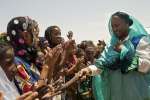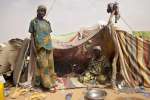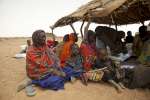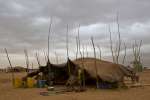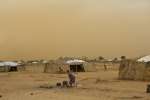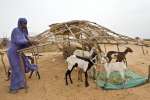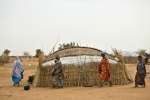As tens of thousands flee, UNHCR ups assistance to Malian refugees
News Stories, 20 March 2012
GENEVA, March 20 (UNHCR) – The UN refugee agency said Tuesday it is boosting assistance to the thousands of Malians who have been uprooted by fighting between Tuareg rebels and Malian forces since mid-January.
UNHCR spokesman Adrian Edwards said the aid was needed because the continuing instability in northern Mali was forcing tens of thousands of people to flee into Burkina Faso, Mauritania and Niger, as well as to other parts of Mali.
"Sixty tonnes of relief, including blankets, mats, kitchen sets and plastic sheeting, are currently being trucked from our warehouse in Accra, Ghana, to Niger as well as 52 tonnes to Burkina Faso. Last week, 35 tonnes of relief assistance items were delivered to Niger and 10 tonnes to Burkina Faso from our stockpile in Douala Cameroon," he said. "The most pressing needs remain shelter, clean water, health care and basic household items," Edwards added.
In Mauritania on Monday, UNHCR completed the relocation of 39,390 refugees from the border to Mbera camp. Relocation is under way in Burkina Faso and in Niger, where over the weekend the refugee agency organized the transfer of more than 2,000 Malian refugees from the volatile Niger-Mali border to a safer refugee camp further inland at Abala.
"At Abala we have installed some 500 tents with our partners and set up the main facilities and services, including water trucking, for newly transferred families. Refugees staying in other sites at the border, such as in Miel, Kizamu Tigizefane and Abala city, are being sensitized by our teams on the possible transfers to safer refugee location in Abala camp," Edwards told journalists in Geneva. The site in Abala has a hosting capacity of 10,000 people.
Meanwhile in Burkina Faso, some 740 refugees who were in transit locations at the Mali border in Oudalan and Soum provinces have been moved to sites located further inland. Transportation was organized by UNHCR and its governmental partner. Potential new arrivals from Mali – 60 to 100 a day, according to the authorities – are now passing through the transit points at the border and continuing their way directly to the proper refugee sites of Ferrerio, Gandafobou, Mentao or Damba.
Access to water remains a concern in these Sahelian regions of northern Burkina Faso: While local populations have shared their wells and water resources with the refugees up to now, aid agencies, including UNHCR, have also started to install water bladders and have trucked water to the refugee sites. Many refugees have brought their cattle from Mali, which is also putting a strain on water resources.
Meanwhile in Mali, thousands of people are internally displaced, mainly in Gao province. Most are staying in nomadic settlements and have fled their cities or villages for fear of renewed fighting. Hundreds of people have reportedly fled the city of Tessalit after it was taken by the rebels two weeks ago and have arrived in Gao. "Refugees in neighbouring countries and IDPs in Mali have told our teams that they are willing to return to their homes, but only when peace is restored," Edwards said in Geneva.





